#poor richelieu
Explore tagged Tumblr posts
Text

Cardinal Richelieu's early years,from a poor kid to bishop of Luçon
#cardinal richelieu#Armand Richelieu#Armand jean du Plessis#i love him sm#history fandom#French history#My poor little patient
57 notes
·
View notes
Text
one thing about me is i look up explicit fanfiction about a character who is a priest and get annoyed when the results are tagged priest kink. not why i'm here
#with mulcahy it was like ok sure like im not gonna read it but he is a priest extremely so sure#with cardinal richelieu im like i firgot hes even a priest like i didnt Forget forget like i Know but lbr hes just a politician basically#ive heard the guy mention god once and it was just to be like oh forgiveness is from god not me. has u killed in front of me#that was fucked up poor adele....#me.txt#musketeers posting
4 notes
·
View notes
Text
Aftermath of a coup: dealing with Marie's and Concini's creatures
Louis XIII dealt with Marie's and Concini's ministerial creatures exactly the way he wanted: according to his scale of political crimes and punishments. Mangot was the most innocuous of the triumvirs; hence, he was merely ordered peremptorily by the king's messenger to hand over the seals of his office, and was not allowed to see his monarch. In sharp contrast, Barbin was immediately jailed and his financial records seized. Ostensibly this action was to facilitate the trial against the Ancres, but it clearly reflected the king's belief that he was guilty of criminal negligence. Marie tried to intercede with Louis, first through Luçon, then at her own leave-taking with her son, and finally by letter from Blois. Barbin was kept in prison for sixteen months, then banished forever from France. Neither his own later appeals to Louis, nor those of Déageant and Luçon, succeeded in restoring his reputation and confiscated assets.
Luçon's fate was more complicated than that of the other triumvirs, reflecting a contest of wills between a hostile Louis XIII and a temporizing Luynes. From the king's perspective, the future cardinalminister Richelieu had three strikes against him: his closeness to Barbin, his indebtedness to Concini for his office, and his terrifyingly bright, authoritarian manner. The monarch revealed all his adolescent distrust on seeing the bishop of Luçon try to join the other secretaries of state after Concini's fall: "So! Luçon! I've finally escaped your tyranny."
Luynes immediately objected that Luçon was not all bad, pointing out the bishop's offer of loyalty before the coup. The king's favorite seems also to have suggested that the cleric's diplomatic skills and influence with the queen mother could help to keep her under control. Louis was sufficiently impressed to let Luçon act as Marie's temporary bargaining agent while she was incarcerated in the Louvre, and to let him accompany her to Blois. The bishop, however, departed soon after for his diocesan residence, probably in anticipation of royal disfavor. Explicit royal orders then sent him further away to the papal territory of Avignon.
These successive exiles undoubtedly reflected Luynes's second thoughts that Luçon was too dangerous a rival to leave with Marie. But they also bear the mark of a suspicious young Louis XIII, terrified of double manipulation by an imperious priest and an irrepressible mother. For his part, Luçon put the best face on his fall from secular grace in his memoirs, doctoring the sequence of events to suggest that the king bore him only good will.
A. Lloyd Moote - Louis XIII the Just
#xvii#a.lloyd moote#louis xiii the just#louis xiii#claude mangot#claude barbin#still stuck with everybody's shit the poor man#cardinal de richelieu#marie de médicis#charles d'albert de luynes#richelieu: i am fine extremely fine i have never been more comfortable in my life ever#louis: oh god you're the worst actually i should kick you out of france#luynes: can everyone maybe calm down ?#richelieu: i am the picture of calm and relaxation
10 notes
·
View notes
Text
#i wonder if an in canon explanation was they were separated on purpose as a final twist of the knife in the gut so to speak#by de guiche because he knew they were friends
Okay, I have been thinking about these tags ever since I first read them, and I need to go feral for a few minutes, bear with me...
When de Guiche first pulls Le Bret aside in the guardhouse and says that he's separating them, Le Bret's first instinct is to tell him to piss off and just walk away. But all the fight goes out of him when de Guiche reveals that he knows about Cyrano's exploits in Arras--did you know he was risking his life every morning just to post a letter? Did you encourage him in this? Or did you just sit there and do nothing while the cadets' finest swordsman put himself in needless danger time and time again? Between this and Cyrano jumping in front of a Spaniard's blade for him, de Guiche makes it clear that he will not have his Captain enabling Cyrano's worst impulses--"there are more men besides that one who need you. And if I have misjudged your leadership capabilities, I expect you to start proving them to me." And through all of this Le Bret starts to think... shit, maybe he was just letting Cyrano walk into harm's way. Maybe he hasn't been doing as good a job at protecting him from himself as he thought. After all, what has he ever done to stop Cyrano outside of bitching and moaning about his foolishness? And besides, what kind of Captain would he be if he ended up neglecting the rest of his men and letting them walk into the same danger? So as much as he hates it--and he hates himself for it--he concedes de Guiche's point.
From that point on, de Guiche has him working at his side more and more often, discussing strategy and coordination of other regiments, even taking reports to the Cardinal whenever appropriate. And while Le Bret's learned how to speak the courtiers' tongue in his twenty years of service, it will never come as naturally as his native Gascon. He still hates these pompous idiots on high who hold his and his brothers-in-arms' lives in their hands, and the more he hears de Guiche suppressing his accent to keep up with his uncle's inner circle, the more he feels a grudging sympathy for the man. Working alongside de Guiche eventually becomes less of a chore, much to his own chagrin, and it's a disturbingly mundane moment for them both when Le Bret actually learns his commander's first name. Meanwhile, he sees precious little of Cyrano anymore. It seems like every time they might have a moment alone together, de Guiche is demanding that moment for another of their discussions. Le Bret wonders how he's doing, how he's coping without Roxanne and Christian. How his new method of distracting himself--namely throwing himself into training the new batch of cadets--is working for him. Seeing these bright-eyed and bushy-tailed young men, so eager to rush out and throw their lives away, is a melancholy experience for Le Bret every year, and there's a part of him that always wants to say, I'm sorry some of you will never make it home. From afar, he's starting to see that same look in Cyrano's eyes, and he wonders if letting that Spaniard stab him would've been less painful.
He finally gets to fucking talk to Cyrano one night at Ragueneau's shop, when de Guiche goes alone to Paris and the cadets get to spend it enjoying themselves. After letting Cyrano carry the conversation for most of it, Le Bret alludes to his own work at their commander's side in vague terms, trying not to divulge the more delicate details. At one point, Cyrano gives him a very wry look--"Have the planets finally aligned to seal Earth's doom, then, that Le Bret is keeping secrets from me?" And with that, Le Bret cracks. He admits that de Guiche has been deliberately keeping them separate, that he believes they've been a bad influence on each other. Almost instantly, he can see that goddamn self-loathing streak of Cyrano's take over, and when his best friend tries to apologize for leading him astray, he's not having a word of it.
"If you insist on such an insulting presumption, Cyrano de Bergerac," he says after shocking them both by yanking him into a fierce and all too brief hug, "I will personally drag you out of this place to demand satisfaction."
"And have us both arrested for public dueling when you've so recently found favor with the Cardinal?" Cyrano's laugh is warmer than Le Bret's ever heard it as he pulls away. "I would never dream of it, my friend." Le Bret remembers a certain comparison to a dog making friends and decides not to question this change in attitude. Absence really does make the heart grow fonder, he's found.
He makes Cyrano promise to take care of himself, and thankfully Cyrano seems to hear how loaded the request is, after so long not being able to make it to his face. But even as Cyrano assures him that Ragueneau won't let him do anything stupid and the night ends on a relative high note, there's still that uncertainty in the air of when they'll be able to talk like this again.
Fourteen years pass like this, with both of them running agonizingly parallel to each other, only to intersect on rare, short occasions. One evening, a now silver-haired de Guiche--now the Duc de Gramont, but Le Bret barely bothers with it--excuses himself to go and visit an old friend. It doesn't escape his notice how his companion, usually so proud and upright as he moves through the world, carries so much weight and tension in his shoulders now and how his head seems to sink beneath his new wig... and all of a sudden Le Bret feels very old indeed. Over forty years he's been doing this, all the while outliving most of his friends and barely keeping up with those who remain. He's tired, and every extremity of his body aches with half a dozen old wounds complaining of the oncoming chill, and he just wants to understand how there are still young men out there who are so quick to follow in his footsteps. They could never be expected to understand...
He misses Cyrano. If anybody out there could understand, it would be him.
That's the evening, when Le Bret finally steps out for some fresh air, that a frantic Ragueneau comes running up to him with the worst news possible. That's the evening he regrets listening to de Guiche more than he's regretted anything in his life.
Never off my bullshit about these characters... please know that I am constantly thinking about Le Bret's absence from the last act of the 1950 Cyrano movie. How Carnovsky's Le Bret was such a secure anchor for Ferrer's Cyrano (how Cyrano always managed to find him in a crowd full of strangers and how Le Bret ran to find him even with an army of cutthroats on his heels), how the last time we saw them together Cyrano had saved Le Bret's life at Arras... and how Le Bret only reappears when Cyrano is about to die, with Ragueneau taking over his role as confidante. I am constantly thinking about what could have kept them from each other's side, when they had been so inseparable before. I am thinking about ways the director and actors must have justified it and wondering about how they could have broken my heart more than the original play already did...
#Jemi continues to drop some *excellent fucking concepts* into my tags that just take root in my brain for weeks#and then I have to go and write a thing about them because I've lost control over my life. XD#To be clear de Guiche doesn't have the full context for Cyrano and Le Bret's interactions--he only knows what he's observed#he's already been predisposed to dislike Cyrano and I don't think the change in attitude happens overnight.#They're both stubborn assholes who hold grudges after all and poor Le Bret's realizing he tends to attract a certain Type.#I actually became genuinely kind of invested in the relationship between de Guiche and Le Bret halfway through writing this#like... I wonder if Le Bret could be the same grounding influence on him that he is on Cyrano#and I wonder if he would even realize he's doing it.#Shout-out to whoever decided to actually have Cardinal Richelieu make a cameo as an actual character in the 1950 movie--#love having both the historical context and the context for de Guiche's character too.#Plus I always have a lot of feelings about Carnovsky's Le Bret ending up as this fixed point in a changing world#so it was a nice bit of texture especially since Richelieu dies midway through the Thirty Years' War...#These tags are getting away from me but all this to say thank you Jemi--you are very good at making my brain Do The Spin. :D#cyrano de bergerac#le bret#comte de guiche
29 notes
·
View notes
Note
I also have one question in my mind like what happened in the 1st tl war? Like I generally don't know who was against each other in the war , safavid vs kaiserreich or church vs kaiserreich? And if we read halima's research back in ch 36 and did safavid won the war over the empire? Did Jeremy and the others died? I would like to know your take on this , since I am newbie in the fandom, I am dumbfounded
Sure! I know it's a little confusing to pick up on which war the characters are talking about at each given moment, but we can break it up into 3 different parts.
1. The Imperial War that took place before the timeline split
2. The Holy War that started after Shuri's death in the 1st timeline
3. aka the tensions that may be leading up to the 2nd timeline version of the Holy War.
I'll go into further detail below! Spoiler Alert!
The Imperial War (~1090s): A war within Europe
The Imperial War was one of the greatest achievements of the Empire.
It took place before our main cast was born, and the Emperor Maximillian, Johannes, Albrecht, and Alicia all fought in it.

We don't know much about this war but iirc, it's heavily implied that the Imperial War was largely for means of expansion. We still get small hints of the effect of the Imperial War with Albrecht going on trips and touring these territories.
The manhwa doesn't specify who the Empire was fighting against, but we can assume it was probably the ASM equivalent of 19th century Prussia... or something of the like.
***Safavid was not involved in this war but the war Halima is referring to in Chapter 36 is the Imperial War. More on this later.

The Holy War ver. 1 (1119~??): The Kaiserreich Empire vs Safavid Kingdom
The Holy War started as a result of two things: the growing gap between nobles and the poor (as a result of corruption within the church) and the death of Shuri von Neuschwanstein by Safavid bandits (as organized by the Empire's Church). The Holy War was pretty much a huge coverup for the Church's wrongdoings. They shifted the attention to Safavid and called for divine command, which is why it's dubbed the "Holy" War.
This is the war that Jeremy enlists in alone. The epilogue chapters that describe this ends right when the War starts, so we don't know exactly what happened to Jeremy after he is sent to war.

The Holy War ver. 2 (has not happened):
The church's corruption is still running rampant in our current timeline, and Shuri's life is still in danger. Although Cardinal Meissner was arrested, the two main culprits for kickstarting the Holy War in the 1st timeline, Cardinal Richelieu and the Pope Eugenio, are still active.

***Both Halima and Ali are aware of the Church's corruption and how it reflects on the Empire. Safavid's power is growing and the difference in religions is enough cause for political pressure between the two regions. Halima is especially motivated to see Safavid surpass Kaissereich in terms of power, but that doesn't necessarily mean that they will wind up fighting in a war.


All the characters in ASM are constantly gearing up for the possibility of another war happening but we don't know how things will play out as of yet. The tipping point has yet to come but it seems like Church is planning to take a hit on the Theo instead of Safavid.
My Thoughts
Some text in the manhwa suggest the possibility of an entire dissolution of the Church, but I don't think it'll happen. In our current timeline, the Church and the Royal Family are carefully and deeply intertwined, constantly keeping each other's power in check and I can't see the Empire leaving all of its power to the Royals. Theo is way too crazy to be in complete power if you know what i mean
the last chapter of Season 2 revealed that the Church was planning to take Shuri and Jeremy to trial, which I'm assuming, is to bring attention and strike rage into the reputation of one of the most powerful noble families in the Empire.
Where Safavid will play a role? I don't know yet. We'll just have to keep waiting to see, I suppose.
#a stepmother's marchen#the fantasie of a stepmother#stepyapping#halime pasha#jeremy von neuschwanstein
20 notes
·
View notes
Text
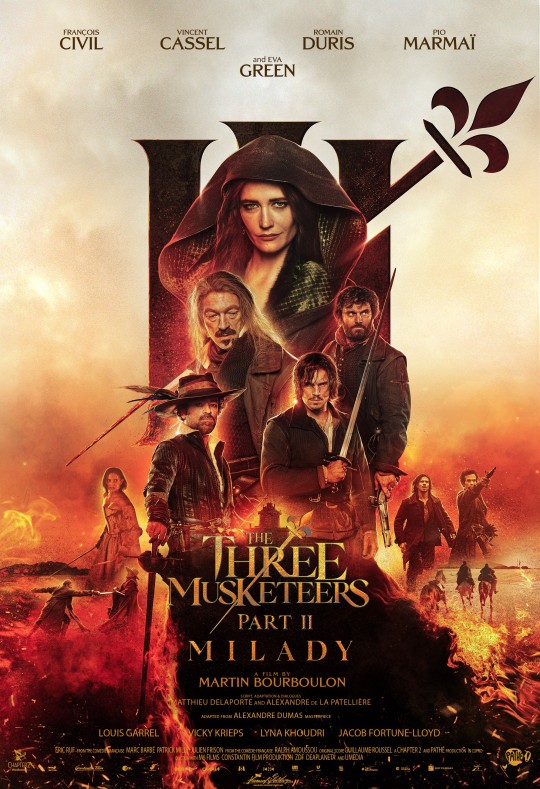
I finally watched the 2023 French fanfic of my favorite book, i.e. The Three Musketeers: Milady, part deux of Martin Bourboulon's two-part adaptation of the Alexadre Dumas' novel. I talked about part 1 - The Three Musketeers: d'Artagnan - earlier, but I like to think of them of them together as one oeuvre, since they were shot as one film and then split into two cinematic releases.
Those of you who know me, understand by now that my movie reviews predominantly judge these movies not as standalone works of cinema but as adaptations. I don't ever ask for historical or canonical accuracy (which I have long ago accepted is much too much to ask for), but what I look for is that the plot and the characters serve the underlying spirit of the original Dumas novel. And perhaps this is why, more so than with other - admittedly much more terrible - adaptations, this one just makes me blind with rage. I don't know when filmmakers decided that how we like our morally gray characters is somehow justified, redeemed, and generally de-clawed. If what they were going with here was to make Milady de Winter, the murderous villainess of the novel, into some kind of a post-feminist hero, then they have failed miserably. (Lots of spoilers below the cut)
I don't usually feel the need to put SPOILER warnings on adaptations of the 3 Musketeers, but this ones veers so far off plot that I'm putting it here just in case.
Let's start by saying that it is certainly not Milady who is the main villain of these movies. It's not even Cardinal Richelieu, the man who seems to pull her strings. Rochefort, sadly, does not even appear in this adaptation, and honestly, I feel like docking a point just for that. Apparently M. Bourboulon decided that Dumas' masterpiece just wasn't interesting enough on its own, so he felt the need to "beef" it up, i.e. rewrite the narrative by taking out critical characters like Rochefort and Lord Winter and substituting them with new characters like Mathilde (Aramis' knocked-up sister), Benjamin (Athos' Protestant!!! brother) and maligning poor Gaston le duc d'Orleans by making him the main villain of the duology. Which is a damn shame, because these were all one-note characters foisted upon us at the expense of delightful assholes who made the original novel so fun to read.
And that goes for all the main characters here, including the titular Milady herself. Book!Musketeers are young, reckless assholes, who wench, fight, gamble and generally engage in very questionable behavior. You know, "boys will be boys" - and I do mean that with every possible connotation, i.e. they're horrible. By taking away their youth (excuse moi but Vincent Cassell, who plays Athos, is in his 60's LMAO), Bourboulon would have stripped their bad behavior of any of the benefit and charm of youth. So, I guess, Bourboulon decided to get rid of the bad behavior entirely, instead. Other than Porthos having an occasional bisexual threesome (bless), and Athos drinking while brooding, we don't really see any of the musketeers being the delightful assholes that I, for one, expect them to be. Strip away everything else, but do not ever take the assholery away from me! Here, they are old and they are boring, and honestly, it makes absolutely no historical or narrative sense that any of them are still in the service.
As for d'Artagnan, our hero, he is painted with such a chaste and faithful brush that I'm not actually sure - is this the same shithead who in the book fucks Milady's maid so that he can pretend to be Milady's boyfriend in the dark and sleep with her without her consent??? Hm... nope. This d'Artagnan is so faithful to his Constance, even though they barely touched hands, that he rebuffs Milady's (very assertive) attempts at (inexplicably) seducing him. Oh dear, oh dear, you might say. How is she supposed to spend the rest of the movie trying to get her revenge against him for raping her? Oh, that's right. She's not!
This Milady is no villainess but she's certainly no post-feminist heroine either. Her backstory is so cliche, it is for to weep, and I raged and ranted at great length about it here. She was forced to marry at 15! To some unnamed man who beat and raped her! And whom she killed - a totally justifiable homicide - before somehow falling in love and marrying Old Man Athos and bearing him a child (future Mordaunt? I see you, cutie!). But alas, Old Man Athos learned of her past crime - because she told him - and turned her over to the authorities, resulting in her being branded (natch) and then hanged (convenient how Athos doesn't actually get his own hands dirty). This Milady has literally Never Done A Thing Wrong. Since there's no Lord Winter, there's no poisoned husband. She never succeeds in killing Buckingham or having him killed. She never tries to even so much as look at d'Artagnan wrong, in fact, they keep saving each other's lives for Reasons of the Narrative, none of them particularly compelling. And finally, our poor Constance, I was really rooting for her to survive this AU, but alas. She ends up once again doomed by the narrative, but so stupidly, that I honestly don't know what to say. It made absolutely no sense for Queen Anne to hide her in England with the Duke of Buckingham since doing so would have implicated her in both treason and adultery. BUT WHAT IS LOGIC? Anyways, suffice to say, it's not Milady's fault that Constance ends up dead in d'Artagnan's arms by the end of the movie.
Don't get me wrong. This Milady is very hot (she is played by Eva Green, after all). But there's really nothing interesting or compelling about her as a character. She's a survivor, determined to survive. WHICH SHE DOES. Yay, it's a Milday-is-alive-at-the-end AU! And, honestly, good for her. By all means, girl, you kill that old man who betrayed you and handed you over to be hanged! He doesn't deserve you! And you abduct your own son and smuggle him out of France to teach that old man a lesson! But for the love of all that is holy, can you please, PLEASE raise him to be at least a tiny bit evil???? Please???
I am begging, can we just let villains be villains? Milady's original character was so much more fabulous not because some man beat and raped her but because of her ability to bend men to her will and whim throughout the novel. She outwits and outmaneuvers all of our "heroes," leaving a titillating trail of bodies and broken hearts in her wake, and it takes TEN MEN in the end to hunt her down and execute her. And listen, Athos spends the rest of his life trying to atone for it. THAT IS HER POWER. This Milady? Blah. And while we're here, this Athos? Double blah. I don't care, let her kill him. There's absolutely nothing interesting about this man. (And yes, I think hanging your wife for lying to you and then becoming a murderous alcoholic about it is very interesting, Athos. Very interesting, indeed.) I'd rather watch Vincent Cassell in Eastern Promises 20 more times - now THAT was a character worth his acting skill!
As for the movies themselves, it's sad to say that the only time both my wife and I felt ANY level of investment was close to the very end, when we were waiting to find out whether Constance was going to die. And most of that was due to the extremely convoluted narrative bending that defied logical sense and occasionally space and time. We did not give a shit about anything else, which does not, generally speaking, a great cinematic experience make. And where Part I at least gave us a few moments of levity and a great win for humanity in bisexual Porthos, Part II is merely dark, drab, and joyless.
Final grade for both parts: I give it a C- as a film and a D as an adaptation, in which the only thing that saves it from being an F is Eva Green's hotness.
#the three musketeers: milady#the three musketeers#2023 the three musketeers#alexandre dumas#my life is but a vale of disappointment
14 notes
·
View notes
Text
I think what really irked me so much about Disney's The Three Musketeers is that it was so high school AU for a story set in the 17th C. We've got this conflict between the Jocks (the musketeers) and the Theater Kids (Cardinal Richelieu and Captain Rochefort) that the Jocks obviously only win because a smart girl with extremely poor judgement gave them all the answers.
This is not a movie you want to see for the first time as an adult, but with that said, I'm pretty sure I would have felt exactly the same way if I had seen it as a child.
#the three musketeers 1993#unchangeable facts about me#i fucking hate bullies#fictional murders for political intrigue are fine though
3 notes
·
View notes
Text
Capaldi was such a good Richelieu and their dynamic was just great!








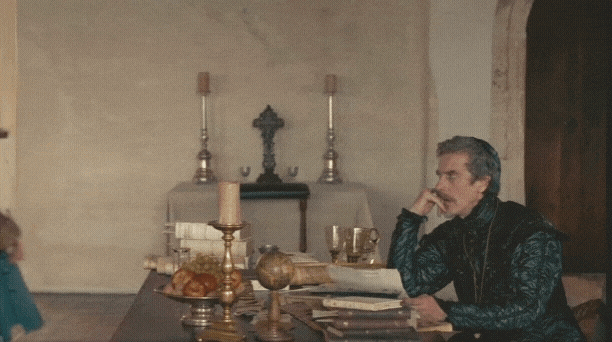

Richelieu + Treville
157 notes
·
View notes
Note
wait George Villiers was a shitty person? what did he do?
Hi! I’d like to preface my answer to this question by saying that I’m not a historian (I have a degree in linguistics and literary studies), and all of my information comes from doing a lot of research regarding George on my own, therefore there might be a lot more info on what exactly he did or did not. So if there is someone more knowledgeable about this, please correct me.
What George Villiers did, and, quite frankly, how his career had gone could be described by a line reportedly spoken by Queen Anna of Denmark to Abbot, the archbishop of Canterbury (and Pembroke), two people who worked together to install George in James’s bedchamber as a favourite “You and the rest of your friends know not what you do. I know your master better than you all, for is this young man be once brought in first person he will plague must be you that labour for him.”
As opposed to the previous favourite Somerset (Robert Carr), Gorge was deeply ambitious as he not only wished to enrich himself while in favour, but he also wanted to become an important player in the political sphere. (If I dare say so myself, I believe, that his time as a politician, would not be half as bad if he had received a proper training. Tho he was undoubtedly a shitty, to put it mildly, person) He knew that key to his success was the affection and love of the king as he could literally take everything that was given to him and make him once again the poor George that he once was. (I really do not want to talk about their relationship as it would take more than a sentence to summarise it). Thans to how rapidly he climbed the social ladder and received more titles and positions at the court which in turn allowed him to have actual sway in the country’s internal and external politics. Geore was also keenly aware that apart from the royal favour he needed connection to face his opposition (the ancient families of England). So patronage, it was something common (even now). He installed his immediate family at the court and secured them positions, (mmm nepotism), the marriage market was also fair play as George slowly but surely arranged marriages for people in his family, win-win situation.
Addressing his now growing family, his wife – Kate Manners, became one as he possibly kidnapped and raped her. (There are some rumours that he “what-a-surprise got locked” with her in one building so after that they just had to get married.) It was a marriage for the money she could bring, and the connections did not hurt either, a nice bonus, one might even say. He also made a deal with Edward Coke to marry off his daughter (her mother protected her fiercely) to his brother. It is said that she cried during the ceremony.
In lieu of the theme of nepotism, as he slowly transformed the royal bedchamber into a place of the de facto lawmaking. He packed every place possible (to an extent) with people what would back him up. For that he was notoriously selling patronages, titles, and land, especially in Ireland where law did not hold him so much. Literally whenever the parliament tried to remove him from power because of how badly (Imo he would have done much better if he had training and not just gone with the general fuck around and find out rule.) he did his job, and people were fed up with him. He started a whole 20D chess match with Richelieu which was pointless, started a few campaigns that ended with him often not paying the soldiers (I mean no one would stab him to death over such thing… right), the last one being a pointless siege that only made England loose troops and money. (He could have one that one, he was so close to it, but he had to celebrate the possibility of victory rather than making people sing papers). He enraged the protestant England by helping to offer help France with fight off Protestants. What else… oh yes, he almost sa’d Anne of Austria which just… mmm the flavour of historical silencing of women, misogyny and men who just have dick measuring contests because.
Tho what I do not believe, and what many line up with, is that he did not poison James (or at least wasn’t aware of doing so??) because I think that he would gain more from helping the king survive than just killing him.
Sources
Bellany, Alastair, and Thomas Cogswell. 2015. The Murder of King James I. New Haven: Yale University Press.
Cogswell, Thomas. 2017. James I (Penguin Monarchs). Penguin UK.
Lockyer, Roger. 2014. Buckingham. Routledge.
Stewart, Alan. 2014. The Cradle King. St. Martin’s Press.
Veerapen, Steven. 2023. The Wisest Fool. Birlinn Ltd.
10 notes
·
View notes
Text
THOUGHTS ON EPISODES 7 AND 8:
Episode 7:
RICHELIEU MY POOR LITTLE MEOW MEOW
A Richelieu-centric episode ??? Sign me THE FUCK IN (seriously though he may be my favorite character in the book i'll take any crumbs I can)
Also loved to see him and Milady interacting more !!! Super nice 🖤⚜️
GO APESHIT RICHELIEU
FUCK THE POPE RICHELIEU
In the book (SPOILER ALERT) Milady tells a story very similar to the false testimony she gives in court in order to make Buckingham's right-hand man believe he abducted and raped her and turn him against him- it's really nice to see that referenced in the show
Like to see Louis actually having a personnality
Liked Ninon ! But why would you fall for Athos when ARAMIS IS RIGHT HERE
Also I do think they didn't need her to romance anyone to make her interesting in that episode ? I understand it's the usual plot device but ah well
Love how the last shot of the episode is Constance pining d'Artagnan against a shelf. We all know who's the top in the relationship
To conclude: great episode, did I mention i loved to see more of Richelieu ?
RICHELIEU MY POOR LITTLE MEOW MEOW
Episode 8:
MILADY MY POOR LITTLE MEOW MEOW
Love how the skirt-chasing for money is exactly how it works in the book
Alice (Porthos' love interest) is a pretty good reference to his mistress in the book and a very nice lady but I think the hilarity of Porthos having to deal with her original version would've been amazing (an older woman married to a cupid man who won't spend a dime while they're both just desperately waiting for him to pass to inherit his fortune)
Love how (in the French version at least) d'Artagnan is barely portrayed as actually caring for his farmers' lives, only his cash xD
De Tréville is a good dad
Love d'Artagnan just walking into Richelieu's office like he owns the place
Richelieu is having a mental breakdown
GOOD FOR HIM MY POOR LITTLE MEOW MEOW
But don't be mean to Milady >=(
Milady and Athos being like: love in the air ? Wrong ! Gas leak =D
Mr. Bonacieux is very nice with Constance though. Like I would not have reacted that well
Also nice to see him working for Richelieu. The people who made this show clearly dearly care for the book
d'Artagnan getting promoted !!! Yeah =D now he's got the cool shoulder pad
d'Artagnan in the book 5000000000% wants Milady and does still a dude's identity for the second time in order to essentially rape her though so it's nice to see d'artagnan having a moral backbone more solid than that of a chocolate éclair
So uh. I do think Aramis took his own sword back from his ex's grave
Btw in French at least right before they start the duel d'artagnan says something like "speaking from personal experience, never trust in love" and Athos gives him a dramatic side eye. This can be explained in two ways: 1- he relates 2- d'artagnan YOU'RE SAYING THAT IN FRONT OF YOUR POLYCULE
Also once Alice dumps Porthos in the French version him and Aramis have an exchange that's like "So you're not gonna marry her" "Who would take care of you if I did" and I love them
Before he gets dumped, Porthos also says something to the effect of "there's a life after being a musketeer" to shut Aramis' criticism down. Boy don't give him ideas. If this was book! Aramis he'd take it to heart have an existential crisis lock himself in a room for weeks and whip himself crying about how he's gonna become a cleric
Edit: fixed a typo from Milady and Porthos to Milady and Athos
#the musketeers#d'artagnan#aramis#porthos#athos#richelieu#milady de winter#louis xiii#the three musketeers#alexandre dumas#dgix watches the musketeers#the musketeers bbc#monsieur bonacieux#constance bonacieux
24 notes
·
View notes
Text
Brazil 🇧🇷

Tradition
Carnaval is a wild celebration of food, alcohol, music and fun. It's held annually for a few days before the start of Lent, the 40-day period of fasting, abstinence and repentance that's observed by the Roman Catholic Church before Easter. The word carnival comes from the Latin carne vale, or "farewell to the flesh"
The Portuguese brought the practice of Carnival to Brazil around 1850, patterning it mainly on the Parisian tradition of holding masquerade parties and balls at this time of the year. However, the Brazilians morphed it into a version uniquely their own over time, adding in elements from the people's African and indigenous cultural backgrounds.

Thus, Carnival in Brazil eventually incorporated lots of parades, elaborate costumes, music, dancing and balls. A tradition also developed where people dress up in opposing roles: men dress as women, aristocrats dress as commoners, the poor dress as the rich.
Carnival is held all over the country; celebrations differ a bit by region, but Rio de Janeiro's celebration is the most popular, drawing crowds of 500,000 foreigners annually from across the globe.
While all Brazilians love Carnival, the black communities are its most avid participants. This likely stems from the community's historical love of Carnival, as African slaves were freed annually for the festival's duration.
Traditional outfits

People wear the same types of clothes in many places of the world. Jeans and T-shirts are worn in most countries, replacing traditional garments. But for special occasions or celebrations, some people choose to bring back the memories of the past by wearing a traditional costume. While they don't wear it every day, Brazilians care about their traditional clothing and wear it for different occasions, such as carnivals or national celebrations.
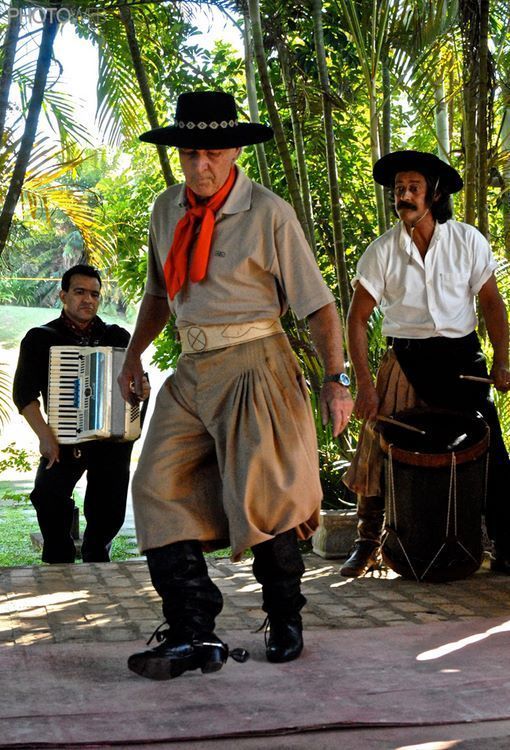
In general, Brazilians wear clothing that's comfortable yet richly colored and sophisticated. However, there are some preferred clothing types depending on region.
For example, those living in the southern plains, a ranching area, wear gaucho-type clothing: baggy pants, or bombachas; cowboy hats and cowboy boots.
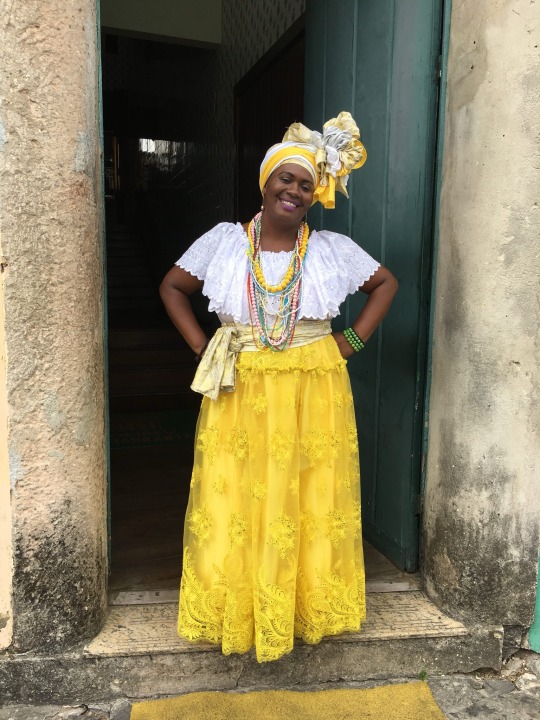

People in the country's northeastern Bahia region, which is heavily influenced by African culture, don long skirts, head scarves and shawls. Items adorned with bordado richelieu -- a type of lace developed in 18th-century France to mimic white Venetian lace, which was brought to Brazil by the Portuguese -- are also popular
Another way to consider Brazilian clothing is country attire versus city attire. Those who live in the country tend to wear shirts, jeans or dresses crafted from an inexpensive cotton material. Women who reside in the city often like to wear short skirts and dresses, and both sexes of city slickers enjoy that most typical of Western attire: T-shirts and jeans.
Statue of Christ the Redeemer.

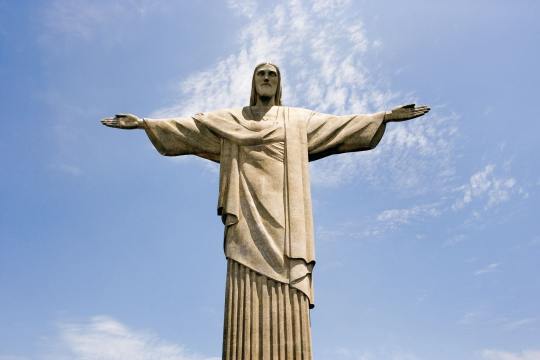
Towering 2,310 feet above the city of Rio, the Christ the Redeemer statue has fascinated experts and historians for nearly a hundred years.
This landmark is must-see in any visit or free tour around Rio, and for good reasons! It’s the fourth largest statue of Jesus Christ in the world, the largest Art Deco-style sculpture on the planet, and to top it all off, in 2007 the statue was deemed as one of the New Seven Wonders of the World along with Machu Picchu, the Great Wall of China and the Roman Colosseum.
Perched on the summit of Mount Corcovado in Rio, the statue stands at a whopping 98 feet (or 30 metres) tall (making it two-thirds the height of New York’s Statue of Liberty), and its outstretched arms reach to 92 feet (or 28 metres) horizontally.
The idea of designing a massive statue of Jesus Christ in Rio first came about way back in the 1850s, when a local priest came up with the idea of placing a Christian monument on top of Mount Corcovado. Apparently he had requested Princess Isabel (the daughter of Emperor Pedro II and Princess Regent of Brazil at the time), to fund the project, but the idea was scrapped after a Declaration of the Republic was declared in Brazil in 1889 – a pinnacle move as it separated the church from the state in the country.
Traditional food
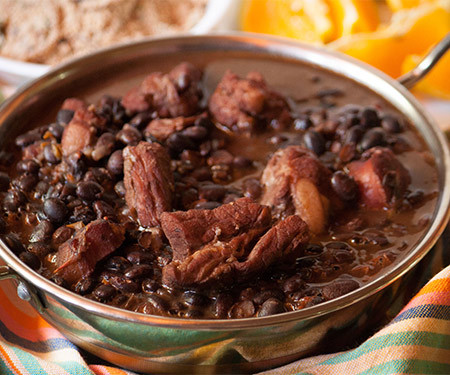
Feijoada.- Brazilian Feijoada is a black bean and pork stew that Brazilians often serve topped with farofa, toasted cassava flour. Many call this comfort food the national dish of Brazil.
Feijoada, a popular Brazilian dish, owes its name to its main ingredient, black beans (feijão). It is a rich stew traditionally made from different parts of the pig, such as feet, ears, and bacon, as well as other smoked meats.

Farofa.- farofa is particularly popular, typical recipes call for raw cassava flour to be toasted with abundant butter, vegetable oil or olive oil, salt, bacon, onions, garlic, sausage, or olives until golden brown.
Farofa is served alongside the main course and can either be sprinkled on by individual diners to their taste before eating, or eaten as an accompaniment in its own right, as rice is often consumed

Moqueca de Camarão.- Brazilian prawn coconut stew (moqueca de camarao) is an easy and delicious low-carb recipe that features a unique combination of spices.
As with many recipes of this kind, you'll find lots of variations for moqueca de camarao, but all of them are loaded with prawns, tomatoes, chillies, garlic, coconut milk, and lime juice.
Vatapá- Brazilian dish made from bread, shrimp, coconut milk, finely ground peanuts and palm oil mashed into a creamy paste. It is a typical food of Salvador, Bahia and it is also common to the North and Northeast regions of Brazil
Acarajé-The crispy bean and onion cakes (acarajé) are stuffed with a flavourful vatapá - a popular Brazillian mix of shrimp, crab, nuts and coconut milk.
Dixon, R. (2018). What Are Some Traditional Clothes Brazilians Wear? | Synonym. [online] Synonym.com. Available at: https://classroom.synonym.com/what-are-some-traditional-clothes-brazilians-wear-12079370.html.
[email protected] (2023). The Story Behind Rio’s Christ the Redeemer Statue | Strawberry Tours. [online] ONEPORT. Available at: https://strawberrytours.com/the-story-behind-rio-s-christ-the-redeemer-statue.
3 notes
·
View notes
Text
Matthew 5:17-19
"I have not come to abolish the Law and the Prophets."

Moses Presenting the Tablets of the Law,
Painted by Philippe de Champaigne (1602-1674),
Painted in 1648
Oil on canvas
© Milwaukee Art Museum
Gospel Reading
Jesus said to his disciples: ‘Do not imagine that I have come to abolish the Law or the Prophets. I have come not to abolish but to complete them. I tell you solemnly, till heaven and earth disappear, not one dot, not one little stroke, shall disappear from the Law until its purpose is achieved. Therefore, the man who infringes even one of the least of these commandments and teaches others to do the same will be considered the least in the kingdom of heaven; but the man who keeps them and teaches them will be considered great in the kingdom of heaven.’
Reflection on the painting
When we hear the word 'Law' as in today's reading, we tend to react immediately in a negative way. The 'law of God' sounds as if it is a set of rules that would restrict us, curb our freedom and tell us what to do. That is of course true in the strictest sense, but it is also true that when we try to live according to the truth it holds, that very law creates this huge freedom for us. The law of God doesn't restrict us but sets us free. Think of sports. A football game wouldn't be a proper game if it had no rules or boundaries. The game is enjoyable and beautiful precisely because it has rules!
The commandments of the Old Law, including the Ten Commandments (illustrated here in Philippe de Champaigne's 1648 painting depicting Moses holding the tablets of the Law), are basic commandments to be followed. Jesus doesn't abolish these, but he builds on them. In a way, we could say that these commandments were more 'external' commandments, as they refer almost entirely to external actions towards other people. Christ now expands further on these old laws. But his commandments (to forgive, to love, to hear, to help the poor…) are more subtle, internal, and appeal more to the heart.
Brussels-born artist Philippe de Champaigne enjoyed a 40-year career painting for aristocracy, including Louis XIII and Cardinal Richelieu. In this magisterial composition, he depicts Moses presenting the Ten Commandments. Moses’ hand and the stone tablets rest directly on a stone plinth and appear to hang over the edge; they seem so close as if we could touch them. Champaigne used a technique called trompe-l’oeil, or “fool the eye” in French, to heighten the feeling that Moses is a real person, coming into our space. With dirt beneath his fingernails and wrinkles in his skin, Moses is further portrayed as a real person. The rich blue color of Moses’ robe, adorned with gold embroidery, is a royal color. The text on the tablets is in French instead of Latin, which was very unusual for the time this was painted. Moses is also depicted with a rod, a symbol of authority, as the tool used by a shepherd to guide his flock. Moses, in fact, initially carried his rod while tending his sheep, and it later came to represent his authority over the Israelites.
Article by Father Patrick van der Vorst
#christian blog#bible reading#christian doctrine#jesus#bible scripture#biblical#glorytogod#bible#faith in jesus#bible study#artists#artwork#art history#art#biblical art#religious art#reflection#read your bible#godly living#follow jesus#bible verse#belief in jesus#kingdom of heaven#spiritual disciplines#spiritual warfare#biblical scripture#christainity#christian faith#christian living#jesus is coming
5 notes
·
View notes
Text
Richelieu- Background and social outlook
Armand-Jean du Plessis de Richelieu's family background and personal career made him familiar with all three estates of the realm plus the royal court and government. His father, François, had risen from the lesser nobility of Poitou to become grand provost at the Valois court. The elder Richelieu was in charge of maintaining order and provisions within the king's personal retinue and was ranked just below the great officers of the king's household (which included the masters of the stable, hunt, wardrobe, and king's chamber). François died serving as a captain of the guards for Henry IV when Armand, born in 1585, was not yet five.
Armand's eldest brother, Henri, was well positioned as a courtiersoldier during Louis XIII's minority; a second brother, Alphonse, decided on the monastic life. Armand was groomed by Louis XIII's riding master, Pluvinel, to be a courtier-soldier, but he was also inclined to theological studies. In 1607, Richelieu embarked on an ecclesiastical career when he assumed the family's recently acquired ecclesiastical post at Luçon. Bishop of a poor diocese, almoner to Queen Anne, and finally a cardinal and holder of several benefices, he was as committed a cleric as he was instinctively a gentilhomme.

Through his mother, Suzanne de La Porte, Richelieu had another rich inheritance. Her Poitevin grandfather had been a tax agent for a local prince, her father a celebrated parlementary lawyer who helped frame the great sixteenth-century ordinances of royal laws. The La Portes were as successful members of the robe nobility as the Richelieus were typical nobles of the sword. The Richelieu who served Louis XIII was a unique exemplar of the values of the three estates. As a cleric, he blended Catholic reformationist zeal and reverence for the Papacy with an appreciation of the autonomy of the French monarchy. He had come to court as a friend of such religious devots as Pierre Bérulle, who founded the second of his famous Oratory seminaries at Luçon; however, bon Français leanings lay just beneath the surface. Unlike the devots, but like Louis XIII, Richelieu respected the Huguenots, while wanting to see them convert peacefully. As bishop of Luçon, he had written a polemic against Calvinism, fought off an attempt by local Huguenots to build a temple adjacent to his cathedral, and fretted about the Protestant state within the state, whose greatest seaboard town of La Rochelle lay just down the road.
Richelieu came to the court with some of the style of a Second Estate noble. He married his relatives into great families like the Condés. He pursued personal wealth. He even used public funds for private interests. Yet he saw the nobility's greatness not in independent lawless acts, but in service to the monarch. He earned the title of duke and peer in that service. And he joined his king in condemning noble violence, horrified by an uncle's dueling death, his father's killing of the offender in a second duel, and his brother Henri's demise in a duel over the spoils of the first War of the Mother and Son.
When it came to the ways of the Third Estate, this descendant of jurists was a curious blend of royal reformer and pragmatist. Like his royal master, he was opposed on principle to venal officeholding and judicial obstruction of state laws; yet he knew how crucial parlementary loyalty was to establishing a climate of submissiveness, by subjects both high and low. Louis had a habit of lecturing judges for interfering with affairs of what he called "my state"; Richelieu saw the need to bring the judgmental ruler around to a compromise that advanced the cause of that state.
Differences in their social outlook were less significant than shared attitudes. Had it been otherwise, Richelieu would have quickly suffered the fate of Louis's previous advisors. The self-effacing monarch who was comfortable in the dress of a simple soldier could tolerate ostentatious tastes only in a cardinal who liked to lead his armies. The frugal king who talked benevolently of "my poor people" could understand the duke and peer who thought of the poor as beasts of burden, at their best when working hard.
A. Lloyd Moote - Louis XIII the Just

#xvi#xvii#a.lloyd moote#louis xiii the just#cardinal de richelieu#louis xiii#françois iv du plessis de richelieu#antoine de pluvinel#suzanne de la porte#anne d'autriche
16 notes
·
View notes
Text
Architectural Door Hardware Market: Long-Term Value & Growth Seen Ahead

Global Architectural Door Hardware Market Report from AMA Research highlights deep analysis on market characteristics, sizing, estimates and growth by segmentation, regional breakdowns & country along with competitive landscape, player’s market shares, and strategies that are key in the market. The exploration provides a 360° view and insights, highlighting major outcomes of the industry. These insights help the business decision-makers to formulate better business plans and make informed decisions to improved profitability. In addition, the study helps venture or private players in understanding the companies in more detail to make better informed decisions. Major Players in This Report Include, METechs Global Inc. (United States), Miseno (Italy), Nostalgic Warehouse (United States), Notting Hill Decorative Hardware (United States), OVE Decors (Canada), Prime-Line Products (United States), Richelieu Hardware (Canada), Rockwell Security Inc. (United States), Rok Hardware (United States), Schlage Locks (United States). Free Sample Report + All Related Graphs & Charts @: https://www.advancemarketanalytics.com/sample-report/184805-global-architectural-door-hardware-market Architectural door hardware is includes such as door handles, hinges, and fittings is mentioned to as Aluminum, iron, steel, brass, and other metals are used in the construction of architectural hardware. They're also used in a variety of construction projects, particularly in residential and commercial structures. In the architectural hardware industry, plastic is also a viable option. Mechanical hardware, building hardware, decorative hardware, daily hardware, and other significant blocks currently account for the majority of the hardware market. Market Drivers
Growing The Demand Of Eco-Friendly Door Hardware
Market Trend
Technological Advancement In Manufacturing Of Door Hardware
Opportunities
Increasing Government And Private Construction Projects Leads The Demand Of Product
Growing The Sales Of Product On Online Platform
Challenges
Lack Of Durability Of Poor Quality Door Hardware
Intense Competition Among Players
Enquire for customization in Report @: https://www.advancemarketanalytics.com/enquiry-before-buy/184805-global-architectural-door-hardware-market In this research study, the prime factors that are impelling the growth of the Global Architectural Door Hardware market report have been studied thoroughly in a bid to estimate the overall value and the size of this market by the end of the forecast period. The impact of the driving forces, limitations, challenges, and opportunities has been examined extensively. The key trends that manage the interest of the customers have also been interpreted accurately for the benefit of the readers. The Architectural Door Hardware market study is being classified by Type (Contemporary, Traditional, Classic, Other), Material (Metal, Glass, Wooden, Ceramic, Other Materials (Plastic, Stone)), Distribution Channel (Online, Offline), End use (Commercial, Residential) The report concludes with in-depth details on the business operations and financial structure of leading vendors in the Global Architectural Door Hardware market report, Overview of Key trends in the past and present are in reports that are reported to be beneficial for companies looking for venture businesses in this market. Information about the various marketing channels and well-known distributors in this market was also provided here. This study serves as a rich guide for established players and new players in this market. Get Reasonable Discount on This Premium Report @ https://www.advancemarketanalytics.com/request-discount/184805-global-architectural-door-hardware-market Extracts from Table of Contents Architectural Door Hardware Market Research Report Chapter 1 Architectural Door Hardware Market Overview Chapter 2 Global Economic Impact on Industry Chapter 3 Global Market Competition by Manufacturers Chapter 4 Global Revenue (Value, Volume*) by Region Chapter 5 Global Supplies (Production), Consumption, Export, Import by Regions Chapter 6 Global Revenue (Value, Volume*), Price* Trend by Type Chapter 7 Global Market Analysis by Application ………………….continued This report also analyzes the regulatory framework of the Global Markets Architectural Door Hardware Market Report to inform stakeholders about the various norms, regulations, this can have an impact. It also collects in-depth information from the detailed primary and secondary research techniques analyzed using the most efficient analysis tools. Based on the statistics gained from this systematic study, market research provides estimates for market participants and readers. Contact US : Craig Francis (PR & Marketing Manager) AMA Research & Media LLP Unit No. 429, Parsonage Road Edison, NJ New Jersey USA – 08837 Phone: +1 201 565 3262, +44 161 818 8166 [email protected]
#Global Architectural Door Hardware Market#Architectural Door Hardware Market Demand#Architectural Door Hardware Market Trends#Architectural Door Hardware Market Analysis#Architectural Door Hardware Market Growth#Architectural Door Hardware Market Share#Architectural Door Hardware Market Forecast#Architectural Door Hardware Market Challenges
0 notes
Text

THE DESCRIPTION OF SAINT JOHN EUDES Feast Day: August 19
"Let us therefore give ourselves to God with a great desire to begin to live thus, and beg Him to destroy in us the life of the world of sin, and to establish His life within us."
How little we know where God’s grace will lead. Born on a farm in northern France, John died at 78 in the next 'county' or department. In that time, he was a religious, a parish missionary, founder of two religious communities, and a great promoter of the devotion to the Sacred Heart of Jesus and the Immaculate Heart of Mary.
John joined the religious community of the Oratorians and was ordained a priest at 24. During severe plagues in 1627 and 1631, he volunteered to care for the stricken in his own diocese. Lest he infect his fellow religious, during the plague he lived in a huge cask in the middle of a field.
At age 32, John became a parish missionary. His gifts as a preacher and confessor won him great popularity. He preached over 100 parish missions, some lasting from several weeks to several months.
In his concern with the spiritual improvement of the clergy, John realized that the greatest need was for seminaries. He had permission from his general superior, the bishop, and even Cardinal Richelieu to begin this work, but the succeeding general superior disapproved. After prayer and counsel, John decided it was best to leave the religious community.
That same year John founded a new community, ultimately called the Eudists—the Congregation of Jesus and Mary–devoted to the formation of the clergy by conducting diocesan seminaries. The new venture, while approved by individual bishops, met with immediate opposition, especially from Jansenists and some of his former associates. John founded several seminaries in Normandy, but was unable to get approval from Rome—partly, it was said, because he did not use the most tactful approach.
In his parish mission work, John was disturbed by the sad condition of prostitutes who sought to escape their miserable life. Temporary shelters were found, but arrangements were not satisfactory. A certain Madeleine Lamy, who had cared for several of the women, one day said to him: 'Where are you off to now? To some church, I suppose, where you'll gaze at the images and think yourself pious. And all the time what is really wanted of you is a decent house for these poor creatures.'
The words, and the laughter of those present, struck deeply within him. The result was another new religious community, called the Sisters of Charity of the Refuge.
John Eudes is probably best known for the central theme of his writings: Jesus as the source of holiness; Mary as the model of the Christian life. His devotion to the Sacred Heart and to the Immaculate Heart led Pope Pius XI to declare him the father of the liturgical cult of the Hearts of Jesus and Mary.
Source: Franciscan Media
1 note
·
View note
Text

As my lovely wife @zoi-no-miko said "We must feed the source of our marriage!"
And so, I bring you my sacrifice and review of the OTHER 2023 The Three Musketeers movie, compliments of the UK. And this one has a Black d'Artagnan! Unfortunately it also has a 1.8/10 IMDB rating 🤣
Ramblings and review under the cut!
Having watched this 94 minute "masterpiece" I must start by saying, this is not an adaptation of the Dumas novel, it's an adaptation of the 1993 Disney version of The Three Musketeers. So, all the best parts are lifted straight out of the Disney movie, including direct lines of dialogue, and the best action sequences. Le sigh.
The plot is also quite similar. The Cardinal plots to have the young king assassinated, and to accomplish this, he has an elaborate plot to disband the musketeers and implicate them in the murder. A one eyed Rochefort and a comely Indian Milady are his co-cosprators.
Richelieu, who I must keep reminding everyone was in his late 30s during this time historically, now looks like this:

And the musketeers, delightful assholes that they are, look like this:


That's right. They are so poor, they can't even afford pants! Just kidding, but for Reasons, they spend a fairly long scene pantless, and require the help of "Madam Chevreuse" (an homage to Marie de Rohan) and "Madam Coquenard" (an homage to Porthos' wife), who were a delightful little invention that I rather appreciated. Especially since Porthos had to sleep with them both in exchange for their help 🤭👌🏻.
Unfortunately, the rest of the movie is fairly Meh. Unlike The Fourth Musketeer, which took place entirely indoors, this one does its low budget business entirely in some "forest" which looks a lot like a local park. There are also about 11 extras who have to cover their faces in every scene so that they can be killed over and over again. The dialogue is really stilted, d'Artagnan is as breathtakingly dumb as the one in The Fourth Musketeer, and the pacing is completely off, causing surprisingly dull periods to pass that make the movie feel a lot longer than it is.
In a plot device that is truly inspiring in its stupidity, people go around saying things like "Have you seen this symbol ⚜️? Take a good look at it ⚜️⚜️" as if all of France isn't literally covered in ⚜️⚜️⚜️, including the embellishments around d'Artagnan's own neck. At least they use proper French currency in this one.
I think the biggest problem the movie has is that it fails to commit to a genre, going from slapstick comedy to taking itself way too seriously within minutes.
So, in summary, this fails spectacularly as both an adaptation of the book AND as an adaptation of the Disney movie. The casting of the 3 assholes was actually pretty good and it did have some fun moments, but all of them were plagiarized so I can't really give them points for it. It's really disappointing that with all the juicy goodness that both sources of material have to offer, the result is this lackluster and forgettable experience.
Grade: I have to give it an F for originality, and as an adaptation of the Disney movie it gets a C+.
17 notes
·
View notes